人教版九年级英语12单元教案
人教版九年级英语下册Unit 12教案导学案有反思

Unit 12Life is full of the unexpected.第一课时Section A(1a-2d)Target Navigation【目标导航】Key words and phrases:unexpected,backpack,oversleep,give…a lift,by the time(that)Key sentences:(1)By the time I got up,my brother had already gotten in the shower.(2)When I got home,I realized I had left my keys in the backpack.(3)When I woke up it was already 8:00 a.m.!(4)Before I got to the bus stop,the bus had already left.Skills:能听懂别人叙述过去的事情,能初步运用由when/before/by the time(that)引导的时间状语从句叙述过去的事件。
Emotion:通过让学生叙述过去发生的事件,让学生学会倾听,学会关心别人。
The guidance of learning methods【学法指导】听说法,小组合作角色扮演。
Learning important and difficult points【学习重难点】1.能听懂别人叙述过去的事情。
2.能初步运用由when/before/by the time引导的时间状语从句叙述过去的事件。
3.掌握Key sentences中的四个句型。
Teaching Steps【教学过程】Autonomous Learning Scheme【自主学习方案】☞预习指导与检测(一)预习指导1.预习Page 89、90的生词和短语,根据音标会读记。
2.朗读Page 89、90的句子,能英汉互译。
人教版九年级英语全一册第十二单元Unit12教案
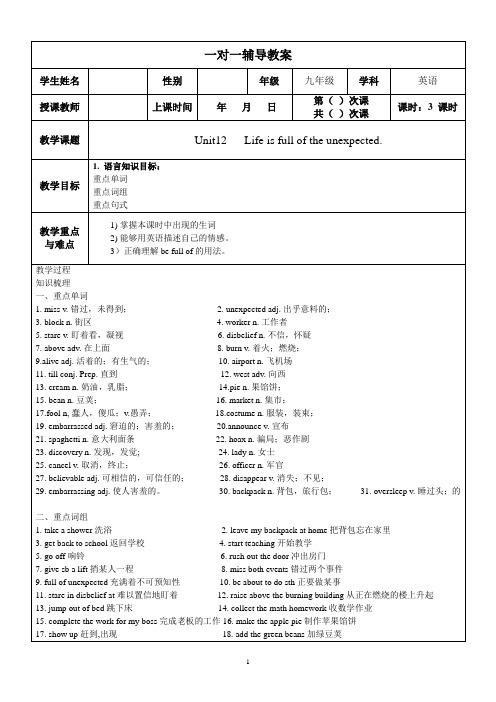
A. had started learningB. have started learningC. started to learnD. started learning
【解析】by the time所引导的从句是一般过去时,其主句要用过去完成时。正确答案是A。
19. embarrassed adj.窘迫的;害羞的;20.announce v.宣布
21. spaghetti n.意大利面条22. hoax n.骗局;恶作剧
23. discovery n.发现,发觉; 24. lady n.女士
25. cancel v.取消,终止;26. officer n.军官
A. were learningB. have learntC. learnt D. had learnt
【解析】由时间状语By the end of last year可知应用过去完成时,即“had+过去分词”。正确答案是D。
3. Since 2000, Nanchang has become a new city. Everything ____.
当他把面条放进碗里时,他意识到他忘了添加绿豆荚了。
7. Before she got a chance to say goodbye, he had gone into the building.
在她得到一个向他告别的机会之前,他已经进入楼房了。
Section A(1a ~ 2d)
a.词汇包:by the time到……时候
b.句式包:
1.By the time I got outside, the bus had already left.当我出来的时候,公共汽车已经走了。
【精选】人教版九年级下册英语第十二单元《Unit 12 Life is full of the unexpected》优秀教案

Unit 12 Life is full of the unexpected.Section A (1a-2d)【学习目标】1.重点单词:unexpected,backpack,oversleep,ring2.重点短语:leave my keys in the backpack,go off,wake up,at least,give...a lift,by the time...3.重点句式:Life is full of the unexpected.By the time I got up,my brother had already gotten in the shower.Before I got to the bus stop,the bus had already left.Carl's dad saw me on the street and gave me a lift in his car.【学习重点】1.重点短语和句型2.过去完成时态【学习难点】过去完成时态【自主学习】一、预习课本P89-90新单词并背诵,完成下面的汉译英。
1.背包______________2.睡过头______________3.出于意料的______________4.(钟、铃等)鸣;响______________二、认真预习1a-2d找出下列短语和句型。
1.在……以前2.(钟表)发出声响3.睡醒4.至少5.捎(某人一程)6. 把我的钥匙丢落在背包里。
7.生活充满了出乎意料的事情。
8. 当我起床的时候我的弟弟已经进去洗澡了。
9.在我到达车站之前,公交车已经离开了。
10. 卡尔的爸爸在街上见到我,捎了我一程。
【课堂导学】Step 1情景导入Teacher:When was the telephone invented?Whom was it invented by?Student 1:The telephone was invented by Bell in 1876.Teacher:When was the TV invented?Whom was it invented by?Student 2:The TV was invented by Belld in 1927.Teacher:That is to say,when Belld invented TV in 1927,Bell had invented telephone in 1876.环节说明:本环节既复习了被动语态又引出了本节课的重点——过去完成时态。
人教版九年级英语12单元教案

Unit12 You are supposed to shake hands.重点短语词组应该做某事be to do sth 握手访问by 毕竟本应该做但没做have done 餐桌礼仪table到达at/in 有点晚late习惯于某事be/get to sth 习惯于做某事be/get sth 被用于做某事be sth 被用作.... Be过去常常做某事sth 特地,不怕麻烦的做某事使某人感到宾至如归计划做某事sth没有理由have 注意你的行为your manners发出噪音make (a) 做鬼脸make自学....by oneself 在适当的时间at the time 以......开始begin 忍不住做某事can't sth代替of 对某事随意be sth邀请某人做某事sb sth 指向重点短语句型讲解:1. Y ou should have asked what you were supposed to wear.你本应该问清楚怎么样穿才得体。
中的“should have asked”是“情态动词+现在完成时”表示过去本应该做某事,事实上没有做,这是虚拟语气的一种表达方式。
如:She should have gone to Beijing. 她本应该去了北京。
(没有去)同时was/were supposed to do sth 表示过去本该做某事而实际上并没有做,就相当于should have done sth.2. make (some) mistakes 犯了(一些)错误。
make a mistake 犯错误(一个)与mistake相关的短语by mistake 错误地mistake…for…把..误认为…5.relaxed:用来形容人,表示人本身很放松,主语一般是人。
relaxing:指物,表示事物可使人很放松。
I feel really after the vacation.经过这次令人放松的假期后我感到很放松。
人教版新目标九年级英语Unit12单元集体备课教案

3)Wehad learned(learn) over 2,000 English words by the end of last term.
4)-Whathappened(happen) to you last week?
5.放下听力材料,要求学生模仿听力内容,利用2a及2b的信息编写故事的结尾,并和同伴分角色练习对话。然后邀请2-3对同学当堂演示。看哪一对的表现最佳。(5分钟)
6.播放2d的对话录音,让学生跟读、模仿并理解大意。然后让学生分角色朗读并表演2d的对话。(5分钟)
环节说明:将听、说、读、写的任务结合起来不仅锻炼了学生的语言综合运用能力,还巩固了学生对目标语言的学习、识记和运用;同时,小组合作对话训练了同学们的合作意识和团队精神;对话的当堂演示使同学们有了学英语的成就感,张扬了性。
参考案例
Teacher:What do you usually do in the morning?
Students:I .____________________________
①put on my clothes and get up
②cook breakfast
③ride to school
…
环节说明:通过上述图片或影片的介绍,使学生对这篇短文有一定的了解,从而达到导入新课的目的。引起学生学习短文的兴趣。
Step 2完成教材3a-3c的任务
【操作案例】
1.要求学生快速默读短文,熟知大意,并完成课本3a的任务。然后邀请几位同学给出自己的答案,全班一起检查讨论。(3分钟)
The answers:
人教版九年级英语第十二单元教案

Unit 12 Life is full of the unexpected. 全单元教案【单元教学内容分析】本单元围绕“Bad days ”这一话题进行教学活动。
运用“By the time…,sb had already done….”句型谈论发生在身边的令人尴尬或难忘的事,学习和巩固过去完成时态。
本单元的核心语言项目是“Narrate past events”,通过一系列的听说读写的训练,加深学生对过去完成时态的理解,在学习和运用过去完成时态的过程中,进一步掌握动词的过去式和过去分词的变化规则,区别现在完成时及过去完成时的用法,最终达到将目标语言运用到真实的生活语境的目的,让学生在用中学,在学中用。
【教学目标】知识目标:1.用过去完成时态来谈论过去发生的事情。
2.正确运用一般过去时,现在完成时,过去完成时叙述自己的难忘经历,并注意事情发展的先后顺序.3.谈论愚人节发生的一些有趣的故事。
语言功能:用过去完成时态来谈论过去发生的事情。
语言结构:过去时态和过去完成时。
重点词汇及短语:oversleep, exhausted, embarrassed, fool, rush, describe, lock, flee, reveal, convince, get married, on time, empty, show up, break down, get dressed.重点句型:What happened?I overslept. And by the time I got up, my brother had already gotten into the shower.When I got to school, I realized I had left my backpack at home.情感目标:1.学会合理安排时间,养成良好的习惯,增强做事的计划性.2.能通过交流分享难忘的经历,增进彼此的了解,学会沟通3.了解西方国家愚人节发生的事情,学会理智地分析事件,不愚弄人.【教学重点】过去完成时的构成及应用。
最新人教版九年级全册英语专题复习教案全集
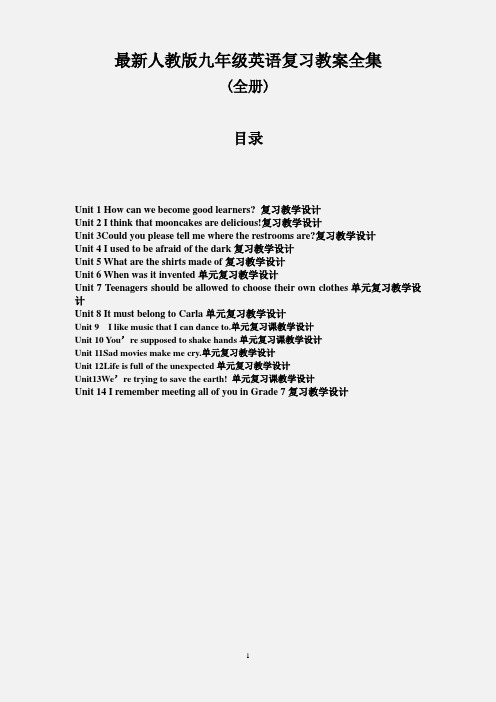
最新人教版九年级英语复习教案全集(全册)目录Unit 1 How can we become good learners? 复习教学设计Unit 2 I think that mooncakes are delicious!复习教学设计Unit 3Could you please tell me where the restrooms are?复习教学设计Unit 4 I used to be afraid of the dark复习教学设计Unit 5 What are the shirts made of复习教学设计Unit 6 When was it invented单元复习教学设计Unit 7 Teenagers should be allowed to choose their own clothes单元复习教学设计Unit 8 It must belong to Carla单元复习教学设计Unit 9I like music that I can dance to.单元复习课教学设计Unit 10 You’re supposed to shake hands单元复习课教学设计Unit 11Sad movies make me cry.单元复习教学设计Unit 12Life is full of the unexpected单元复习教学设计Unit13We’re trying to save the earth! 单元复习课教学设计Unit 14 I remember meeting all of you in Grade 7复习教学设计人教版新目标英语九年级Unit 1 How can we become good learners? 复习教学设计一、设计说明复习课是课堂教学的重要组成部分,是提高教学质量的重要环节,优化设计、精心组织好复习课教学,对学生系统掌握知识、发展思维能力、提高复习效率具有极为重要的作用。
九年级英语教案 Unit 12 Life is full of the unexpected

Unit 12Life is full of the unexpected一、教材分析本单元主要是围绕着“Life is full of the unexpected”这个话题,通过了解不及时做某事而造成的危害培养学生养成良好的行为习惯。
二、三维目标【学习目标】1. 掌握重点词汇:by the time , gotten ,oversleep2. 学习重点句型:( 1 ).By the time she got up , her brother had already gone into the bathr oom. ( 2 ) When she got t o school , she realized she had left her backpack at home . 【能力目标】培养听说能力。
A.能运用以下句型进行交际:By the time I got outside,the bus had already left.When I got to school,I realized I had left my backpack at home.B.能从所听到的对话中获取信息。
C.掌握词汇及短语:get outside,get to school,by the time,start doing,be late for【情感目标】培养学生养成良好的行为习惯三、教学重点过去完成时态的构成及用法。
四、教学难点过去完成时态与一般过去时的不同用法。
五、教学策略以讨论有关“mor ning”的两个问题(1a)引入单元话题,通过听力练习(1b)和对话练习(1c)让学生掌握一个过去完成时的句型;第二模块继续就第一模块的听力材料进行内容和时态练习(2a-2b)以及口语训练(2c);第三模块以一个“hurried morning”的故事展开训练,训练形式为阅读排序(3a)和回答问题(3b)以及口语练习(3c)。
人教版九年级英语上册Unit12 Life is full of the unexpected. 复习教案
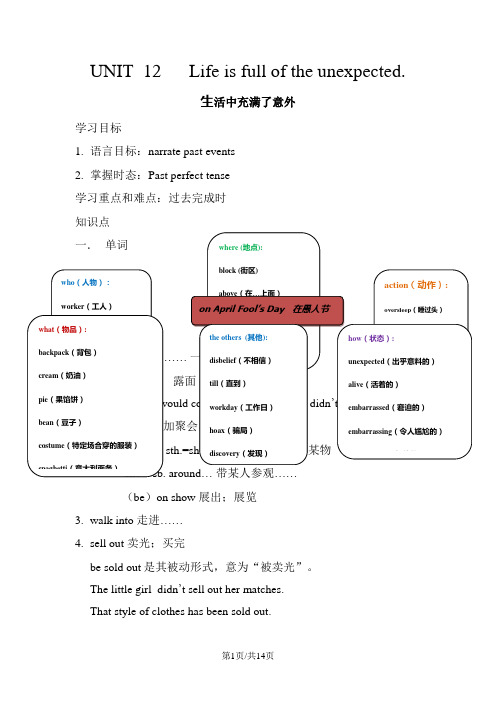
UNIT 12 Life is full of the unexpected.生活中充满了意外学习目标1. 语言目标:narrate past events2. 掌握时态:Past perfect tense学习重点和难点:过去完成时知识点一. 单词二. 短语 1. give …a lift 稍……2. show up 赶到; eg. He said he would come to the party, but he didn 他说要来参加聚会,拓展:show sb sth.=show sth. to sb show sb. around … 带某人参观……(be )on show 展出;展览 3. walk into 走进……4. sell out 卖光;买完be sold out 是其被动形式,意为“被卖光”。
The little girl didn ’t sell out her matches.That style of clothes has been sold out.who (人物): worker (工人) fool (愚人) lady (女士) officer (军官) what (物品): backpack (背包) cream (奶油)pie (果馅饼)bean (豆子) costume (特定场合穿的服装) spaghetti (意大利面条)注意: sth sells well 某物卖得好(主动形式表示被动意义)This kind of bread sells well.5.be full of 充满,装满讲解:be full of (full 是形容词,此处强调满满的状态)=be filled with(filled 时fill的过去分词,此处强调动态的过程)Eg. Her eyes were full of tears.Her eyes were filled with tears.她眼汪汪的。
人教版英语9年级全册Unit12_SectionA(1a-2d)教案
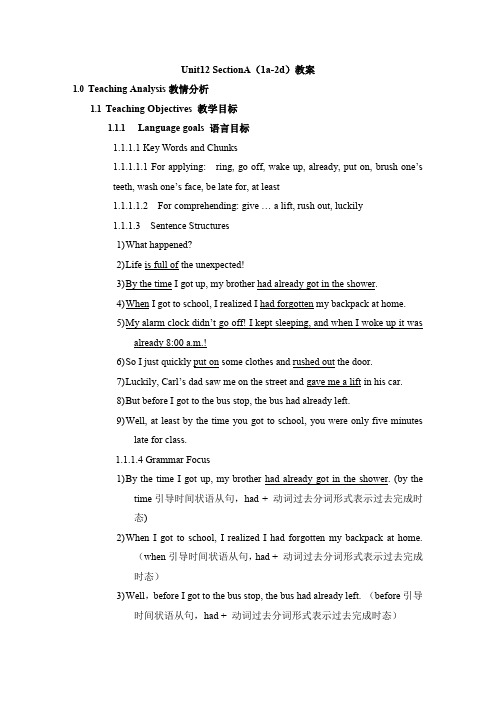
Unit12 SectionA(1a-2d)教案1.0Teaching Analysis教情分析1.1Teaching Objectives 教学目标1.1.1Language goals 语言目标1.1.1.1 Key Words and Chunks1.1.1.1.1 For applying: ring, go off, wake up, already, put on, brush one’steeth, wash one’s face, be late for, at least1.1.1.1.2 For comprehending: give … a lift, rush out, luckily1.1.1.3 Sentence Structures1)W hat happened?2)L ife is full of the unexpected!3)B y the time I got up, my brother had already got in the shower.4)W hen I got to school, I realized I had forgotten my backpack at home.5)M y alarm clock didn’t go off! I kept sleeping, and when I woke up it wasalready 8:00 a.m.!6)S o I just quickly put on some clothes and rushed out the door.7)L uckily, Carl’s dad saw me on the street and gave me a lift in his car.8)B ut before I got to the bus stop, the bus had already left.9)W ell, at least by the time you got to school, you were only five minuteslate for class.1.1.1.4 Grammar Focus1)B y the time I got up, my brother had already got in the shower. (by thetime引导时间状语从句,had + 动词过去分词形式表示过去完成时态)2)W hen I got to school, I realized I had forgotten my backpack at home.(when引导时间状语从句,had + 动词过去分词形式表示过去完成时态)3)W ell,before I got to the bus stop, the bus had already left. (before引导时间状语从句,had + 动词过去分词形式表示过去完成时态)1.1.2Ability goals 能力目标1.1.2.1 学会用when/ by the time引导时间状语从句,用“had+动词过去分词形式”谈论过去的事情。
人教版九年级英语Unit 12 Life is full of the unexpected. 全单元教案
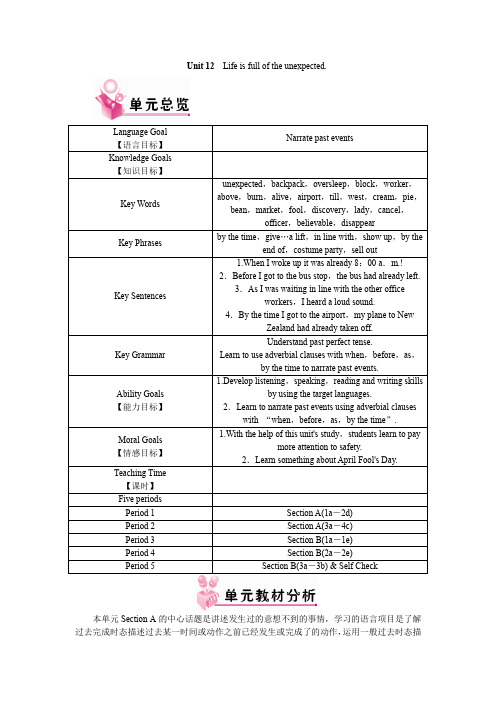
Unit 12Life is full of the unexpected.Language Goal【语言目标】Narrate past events Knowledge Goals【知识目标】Key Wordsunexpected,backpack,oversleep,block,worker,above,burn,alive,airport,till,west,cream,pie,bean,market,fool,discovery,lady,cancel,officer,believable,disappearKey Phrases by the time,give…a lift,in line with,show up,by the end of,costume party,sell outKey Sentences1.When I woke up it was already 8:00 a.m.! 2.Before I got to the bus stop,the bus had already left.3.As I was waiting in line with the other officeworkers,I heard a loud sound.4.By the time I got to the airport,my plane to NewZealand had already taken off.Key GrammarUnderstand past perfect tense.Learn to use adverbial clauses with when,before,as,by the time to narrate past events.Ability Goals 【能力目标】1.Develop listening,speaking,reading and writing skillsby using the target languages.2.Learn to narrate past events using adverbial clauses with “when,before,as,by the time”.Moral Goals 【情感目标】1.With the help of this unit's study,students learn to paymore attention to safety.2.Learn something about April Fool's Day.Teaching Time【课时】Five periodsPeriod 1Section A(1a-2d)Period 2Section A(3a-4c)Period 3Section B(1a-1e)Period 4Section B(2a-2e)Period 5Section B(3a-3b) & Self Check本单元Section A的中心话题是讲述发生过的意想不到的事情,学习的语言项目是了解过去完成时态描述过去某一时间或动作之前已经发生或完成了的动作,运用一般过去时态描述过去某个时间里发生的动作或存在的状态。
新人教版九年级英语下册《nit 12 Life is full of the unexpected. Section A 3a—3c》教案_13
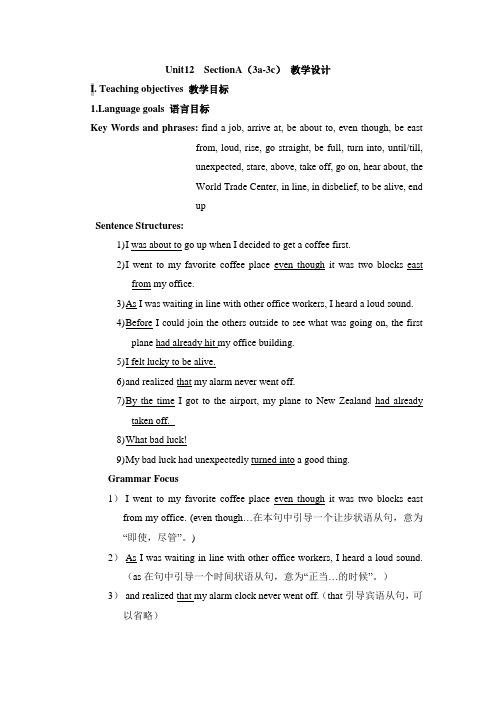
Unit12 SectionA(3a-3c)教学设计I. Teaching objectives 教学目标nguage goals 语言目标Key Words and phrases: find a job, arrive at, be about to, even though, be eastfrom, loud, rise, go straight, be full, turn into, until/till,unexpected, stare, above, take off, go on, hear about, theWorld Trade Center, in line, in disbelief, to be alive, endupSentence Structures:1)I was about to go up when I decided to get a coffee first.2)I went to my favorite coffee place even though it was two blocks eastfrom my office.3)A s I was waiting in line with other office workers, I heard a loud sound.4)B efore I could join the others outside to see what was going on, the firstplane had already hit my office building.5)I felt lucky to be alive.6)a nd realized that my alarm never went off.7)B y the time I got to the airport, my plane to New Zealand had alreadytaken off.8)W hat bad luck!9)M y bad luck had unexpectedly turned into a good thing.Grammar Focus1)I went to my favorite coffee place even though it was two blocks east from my office. (even though…在本句中引导一个让步状语从句,意为“即使,尽管”。
人教新目标英语九年级12单元第一课时教案
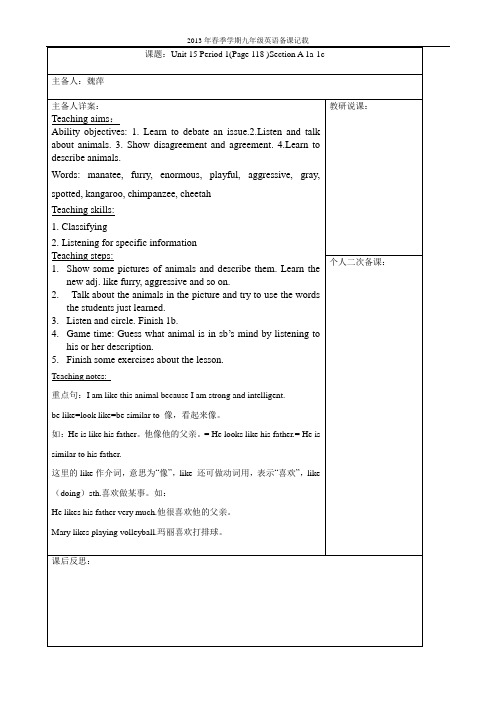
He likes his father very much.他很喜欢他的父亲。
Mary likes playing volleyball.玛丽喜欢打排球。
教研说课:
个人二次备课:
课后反思:
Teaching steps:
1.Show some pictures of animals and describe them. Learn the new adj. like furry, aggressive and so on.
2.Talk about the animals in the picture and try to use the words the students just learned.
3.Listen and circle. Finish 1b.
4.Game time: Guess what animal is in sb’s mind by listening to his or her description.
5.Finish some exercises about the lesson.
Words:manatee, furry, enormous, playful, aggressive, gray, spotted, kangaroo, chimpanzee, cheetah
Teaching skills:
1.Classifying
2. Listening for specific information
Teaching notes:
重点句:I am like this animal because I am strong and intelligent.
九年级英语第十二单元教案人教版

③ Read the first two sentences at the top of the article. explain that the interviewer will talk to several teenagers.
④ Ask students to read the interview on their own. ⑤ Then ask students to read the interview again and write the advantages and disadvantages. (3) 讲解课文,强调本单元的目标语言。同时检查学生的答案。 最后让学生听录音,模仿朗读课文。 (通过阅读,培养学生理解课文,获取信息的能力) 2. Consolidation and Extension
(完整版)人教新目标九年级英语Unit12SectionA(1a-2d)教案
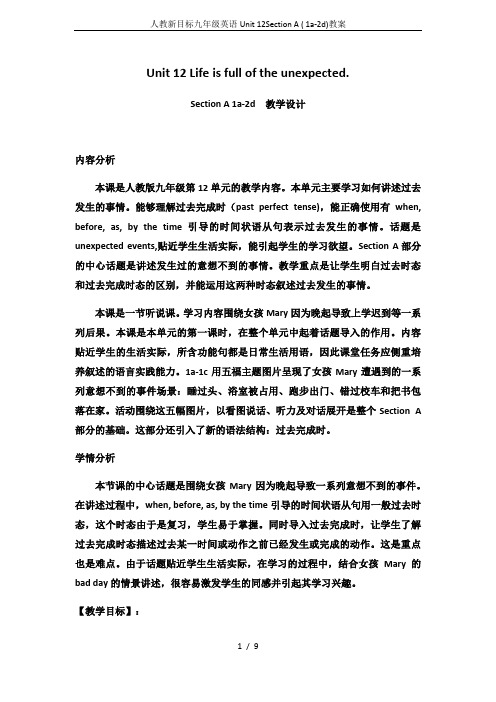
Unit 12 Life is full of the unexpected.Section A 1a-2d 教学设计内容分析本课是人教版九年级第12单元的教学内容。
本单元主要学习如何讲述过去发生的事情。
能够理解过去完成时(past perfect tense),能正确使用有when, before, as, by the time引导的时间状语从句表示过去发生的事情。
话题是unexpected events,贴近学生生活实际,能引起学生的学习欲望。
Section A部分的中心话题是讲述发生过的意想不到的事情。
教学重点是让学生明白过去时态和过去完成时态的区别,并能运用这两种时态叙述过去发生的事情。
本课是一节听说课。
学习内容围绕女孩Mary因为晚起导致上学迟到等一系列后果。
本课是本单元的第一课时,在整个单元中起着话题导入的作用。
内容贴近学生的生活实际,所含功能句都是日常生活用语,因此课堂任务应侧重培养叙述的语言实践能力。
1a-1c用五福主题图片呈现了女孩Mary遭遇到的一系列意想不到的事件场景:睡过头、浴室被占用、跑步出门、错过校车和把书包落在家。
活动围绕这五幅图片,以看图说话、听力及对话展开是整个Section A 部分的基础。
这部分还引入了新的语法结构:过去完成时。
学情分析本节课的中心话题是围绕女孩Mary因为晚起导致一系列意想不到的事件。
在讲述过程中,when, before, as, by the time引导的时间状语从句用一般过去时态,这个时态由于是复习,学生易于掌握。
同时导入过去完成时,让学生了解过去完成时态描述过去某一时间或动作之前已经发生或完成的动作。
这是重点也是难点。
由于话题贴近学生生活实际,在学习的过程中,结合女孩Mary 的bad day的情景讲述,很容易激发学生的同感并引起其学习兴趣。
【教学目标】:1. 语言知识目标:(1)学生能掌握以下单词及短语:unexpected, by the time, backpack, oversleep, ring, give …a lift,(2)学生能够掌握过去完成时的结构和用法。
人教版九年级12-15单元教案

人教版九年级英语12-15单元教案Unit 12 You’ re supposed to shake hands第一课时Ⅰ.三维目标:1. Knowledge Objects(1)Key Vocabularybow, kiss, be supposed to, shake hands, customs (2) Target’ LanguageWhat are people in Korea supposed to do when they meet for the first time?They’re supposed to bow.3. Moral ObjectsBefore you meet foreigners, you should some customs.In this way, you can act politely and properly.Ⅱ. Teaching Key Points Target languageⅢ. Teaching Difficult Points1. How to train students’ listening ability.2.How to train students’communicative competence.Ⅳ. Teaching Methods1. Scene teaching method2.Listening-and-answering activity to help the students go through with the listening material.Ⅴ. Teaching Aids 1. A tape recorder 2. A map of the worldⅥ. Teaching ProceduresStep ⅠRevision T: Yesterday we finished Unit 11. In this unit, we learned some ways of asking for information politely. Now if you want to go to a library to get a book, how can you ask? S1: Do you know where I can get a book? S2: Could you tell me how to get to the library?Step Ⅱ1a This activity introduces some targetlanguage. Let students read the instructions.Point to the two lists of words. Read each word and ask students to repeat it.Put up a map of the world on the board. Ask students to explain where each of the countries is.Ask different students to act out the action described by each word or phrase—bow, shake hands, and kiss. Read the instructions again and ask students to match the customs lettered a, b and c with the numbered countries.Look at the sample answer.Tall students to guess if they aren’t sure.Step Ⅲ1b This activity gives students practice understanding the target language in spoken conversation.Go through the instructions with the class. Point to the lists in Activity la and say, Now you will hear a conversation between a boy and a girl.Step Ⅳ1c This activity provides guided oral practice using the target language.Read theinstructions to the whole class. Point out the examplein the box.Ask two students to read it to the class. SA: What are people in Korea supposed to do when they meet for the first time?StepⅤ板书设计:Unit 12 You’ re supposed to shake hands第一课时What are people in Korea supposed to do when they meet for the first time?Step Ⅵ教后反思:In this class, we’ve learned some important words, such as bow, kiss, be supposed to, shake hands. We’ve also learned the target language What are people in Korea supposed to do when they meet for the first time? They’re supposed to bow.第二课时Ⅰ.教学三维目标1. Knowledge Objects2. Ability Objects3. Moral ObjectsⅡ.Teaching Key Points 1.Key Vocabulary 2. Target Language 3. StructureⅢ. Teaching Difficult Points 1. the target language 2. How to improve students’ listening ability.Ⅳ. Teaching MethodsTeaching ProceduresStep Ⅰ Revision Check homework. SA: What are people in Mexico supposed to do when.Step Ⅱ2a This activity provides guided listening practice using the target language.Look at the picture and ask students to tell What ishappening.Help students understand that the people are at a picnic. Point to Maria and ask, what’s Maria wearing? (She is wearing a dress.)Ask, Does she look comfortable? (No.) Read the instructions and point to the four mistakes on the list.Step Ⅲ2b This activity gives students practice in understanding the target language in spoken conversation. Go through the instructions with the class.Point out the blanks in the four sentences.Invite a student to read the first sentence. Play the recording again. Let students fill in the blanks with the words they hear alone. Correct the answers with the class.Step Ⅳ2c This activity provides guided oral practice using the target language.Read the instructions for the activity to the class. Look at the example in the box. Ask twostudents to read the conversation to the class. Point out the mistakes in Activity 2a and the sentences in Activity 2b. Role play Dan andMaria’s conversation using information from Activities 2a and 2b. Ask students to work in pairs. As they work, move around the classroom checking the progress of the pairs and offering help as needed.Step ⅤGrammar Focus Review the grammar box. Get different students to say the questions and answers.Write these sentences starters: on the board as pairs of incomplete questions and answers: Ask different pairs of students to take turns completing each pair of questions and answers. Give cues to help the students make questions and answers.StepⅥ板书设计:Unit 12 You’ re supposed to shake hands第二课时What are people in Mexico supposed to do when.Step Ⅶ HomeworkAsk students to write at least two sentences with the sentence starters in Grammar Focus.StepⅧ教后反思:In this class, we’ve learned key vocabulary greet and be supposed to, the target language How was the dinner at Paul’s house last night? Well, it was OK, but I made some mistakes. I was supposed to arrive at 7: 00, but I arrived at 8:00 and the sturcture What are you supposed to do when you meet someone?第三课时Teaching ProceduresStep Ⅰ Revision T: In last period, we summed up the expressions for telling what you are supposed to do. Now I’ll check your homework.I’ll ask some pairs to act out the conversations before the class.Step Ⅱ 3a This activity provides reading and writing practice using the target language.Show the key words on the screen by a projector.Read the words and have students repeat again and again until they can pronounce the words fluently and accurately.Read the instructions. Do you know what an opinion is?Ask a student to answer it. Look at the chart. Point to the word attitude on the chart and say, An opinion is like an attitude. Tell students what they will write in the chart.Ask students to read the first paragraph on their own. When they read, move around the classroomhelping them as necessary.Ask students to read the paragraphs again and complete the chart on their own.Correct the answers with the class.AnswersColombian: We’re pretty relaxed about time.We often just drop by ourfriends’ home. We don’t have to make plans when we get together with friends.Step Ⅲ 3bThis activity provides guided oral practice using the target language.Go through the instructions for the activity with the class.Look at the example in the box. Ask two students toread the conversation to the class.SA: What kinds of rules do they have in Colombia? SB: Well, they have pretty relaxed rules.SA: Like what?SB: Well, it’s OK if you’re not on time.First practice this conversation with a partner. Then talk about your attitude toward being on time and getting together with your friends.Use true information.Step Ⅳ Part 4This activity provides reading, Writing, listening and speaking practice using the target language.Let students read the instructions.Ask a pair of students to model the sample dialogue. Correct any pronunciation errors to make sure the students are providing a good model for the rest of the class.SA: Can you tell me the things I’m supposed to do? SB: The first thing is to greet the teacher.SA: Okay. What should I say?SB: You’re supposed to say "good morning, teacher."Get students to complete the work in pairs. As they work, walk around the classroom offering help as needed.Step Ⅴ板书设计:Unit 12 You’ re supposed to shake hands第三课时It’s very important to be on time. We never visit a friend’s house without calling first. We usually make plans to meet friends.Step Ⅵ Homework1. Write a conversation using the information in Part 4.2. Finish off the exercises on pages 49~50 of the workbook.StepⅦ教后反思:In this class, we’ve learned some key vocabulary words land, drop by and after all, and the target language Can you tell me the things I’m supposed to do? The first thing is to greet the teacher. Okay.What Should I say? You are supposed to say "good morning, teacher". We’ve also done a lot of reading, speaking and writing practice using the target language.第四课时Teaching ProceduresStep ⅠRevision Check homework.Get some students to read out their conversations using thetarget language in Section A 4.Collect their conversations and help correct their errors.Step Ⅱ Part 1 This activity introduces new vocabulary and provides reading practice using the target language. Look at the picture and ask students to say what is happening in it. Look at the title, Mind your manners! Ask.What do you think it might mean?Read the instructions and point to the five statements about manners.Ask students to read the statements. Review the five statements to be sure students understand what each one means.Ask students to act out them.Then ask students to complete the quiz on their own.Correct the answers with the class.Step Ⅲ2a This activity gives students practice in understanding the target language in spoken conversation.Read the instructions to theclass.Review what an exchange student is and what table manners are. If necessary, translate them into Chinese. Look at the four pictures. You will hear the exchange student Steve, talking with his Japanese friend, Satoshi.Satoshi is explaining some things you are and aren’t supposed to do when eating in Japan.Point to the boxes where students are supposed to write a number next to each picture..Step Ⅳ2bThis activity provides listening practice using the target language.Read the instructions and point to the numbered list of sentence starters and the lettered list of sentence endings. Ask different students to read the two lists.1. You aren’t supposed to…a. to make noise while eating noodles.2. It’s polite… b. to stick your chopsticks into your food.3.It’s rude…c.point at anyone with your chopsticks.4.You shouldn’t…d.eat or drink while walking down the street.Step Ⅴ 2cThis activity provides guided oral practice using the target language.Go through the instructions for the activity with the class.Look at the example in the box. Ask two students to read the sentence starters.SA: We’re supposed to…SB: Yes, and it’s rude to…Now, complete each one with a true statement about table manners in your country.Step Ⅵ板书设计:Unit 12 You’ re supposed to shakehands第四课时Satoshi is explaining some things you are and aren’t supposed to do when eating in Japan.StepⅦ、HomeworkTalk about the table manners in your country using the sentence starters inActivity 2b.StepⅧ、教后反思:In this class, we’ve learned some key vocabulary, such as wipe, rude, point, pick up.We’ve also learned the target language by listening and speaking.第五课时Ⅰ、三维目标:1. Knowledge Objects2. Ability Objects3. Moral ObjectsⅡ. Teaching Key Point Practise reading and writing using the target language.Ⅲ. Teaching Difficult Point How to write an e-mail message.Ⅳ. Teaching Methods 1. Reading comprehension to help students grasp the main idea of the text. 2. Writing method 3. Groupwork to make every student work in class,Ⅵ. Teaching ProceduresStep Ⅰ RevisionReview the target language presented in this unit. Check homework.Ask two students to read out their sentences.Step Ⅱ3a This activity provides reading practiceusing the target language.Teach the new words.Show the following new words on the screen by a projector.Call attention to the e-mail message. Invite a student to read the article aloud to the class.Correct any pronunciation errors to make sure the student is providing a good model for the rest of the class.Read the instructions to the class. Ask students to read the e-mail again. Say,Now read the e-mail. Answer the questions in your exercise book. As students work, move around the classroom and offer help as necessary.Check the answers with the class.Step Ⅲ 3b This activity provides reading and writing practice using the target language.Read the instructions to the class.Point to the beginning of the e-mail message.Read it to the class. Here are some things you needto know about table manners when you visit Japan. First of all, you should… Look back at thepictures in Activity 2a and the matching exercise in Activity 2b.You can use the pictures and information in Activities 2a and 2b to help you write your letters.Ask students to finish the activity on their own. As they work, walk around the classroom offering help and answering questions as needed. Check the answers with the class. Ask a student to read his completed article to the class.Step Ⅳ3c This activity provides writing practice using the target language.Read the instructions and ask students to look back at Activity 2c.Remind students that they made conversations abouttable manners in their own country.Ask a student to read his or her message to the class. Have other students add any information that is missing from the first student’s report.Optional activityHave students work with the same partner they worked :with when doing Acvity 2c. Ask each pair of students to work together to write a single e-mail message telling someone from ‘another country bout the table manners in their own country.Step Ⅴ Part 4This activity provides reading, writing, listening and speaking practice using thetarget language.Go through the instructions with the class.Ask agood student to give an example.Get students to complete the work in small groups.Cheek the answers. Ask a few students to tell the class about what one should do in different situations. Answers will vary, but should emphasize politeness.Step Ⅵ、板书设计:Unit 12 You’re supposed to shake hands第五课时Section 3a 3b 3c part4Step Ⅶ Homework1. Read the e-mail message in Activity 3a again.2. Write an e-mail message to a friend about table manners.StepⅧ、教后反思:In this class, we’ve done a lot of reading, writing and speaking practice using the target language.Unit 12 You’ re supposed to shake hands第六课时Ⅰ、三维目标:1. Knowledge Objects(1) Fill in blanks and make sentences using arrive, meet, spend, behave and imagine.(2) Finish the story.(3) Complete the crossword.2. Ability ObjectsTrain students’ writing ability.3. Moral ObjectsYou are supposed to learn much more table manners, It is very useful and helpful, especially when you are in foreign countries.Ⅱ. Teaching Key Points1. Fill in blanks and make sentences.2. Finish the story.Ⅲ. Teaching Difficult Points1.Make sentences using arrive, meet, spend, behave and imagine.2. Finish the story.Ⅳ. Teaching Methods1. Teaching by explanation.2. Speaking methodⅤ. Teaching Aids1. The blackboard2. A projectorⅥ. Teaching ProceduresStepⅠ RevisionCheck homework. Ask a student to read the e-mail message in Activity 3a. Then ask a student to read his/her own e-mail message.StepⅡ Part 1This activity focuses on vocabulary introduced in the unit.Look at the words in the box. Ask a student to read them.Make sure students understand the meaning of the words.Then say, Fill in the blanks with the words. In some cases, students may need to use another form of the word, for example adjusting for tense or subject/verb agreement.Ask students to fill in the blanks on their own.Check the answers.Five students each read a sentence, filling in the blanks.The rest of the students check their answers.Show the answers on the screen by a projector.1. People in Japan and people in America behave differently at the dinner table.2. You can imagine how different the table manners are from ours.3.In Singapore, the trains always arrive on time. They are never late.4. On Chinese New Year, people like to spend time with their families.5. I usually meet my friends in the library on Friday nights.Ask students to make their own sentences with the words, preferably sentencesthat are meaningful.Move around the classroom.Collect a few students’answers with mistakes on the blackboard.Then help students correct the mistakes.Step Ⅲ Part 2This activity provides reading and writing practiceusing the target language.Go through the instructions with the class. Explain them to students.Get students to complete the work in pairs.Invite a few students to read the end of the story.Answers will vary but will probably include watching what others do first or asking the host or hostess or one of the guests.Step Ⅳ Part 3This activity focuses on the new vocabulary introduced in this unit.Do the example with the class to show them how to do a crossword puzzle. Ask students to complete the crossword puzzle on their own.StepⅤ、板书设计:Unit 12 You’re supposed to shake hands.Self check第六课时Step .Ⅵ、Homeworkplease finish off the story in 2 in your textbooks. Then finish off the exerciseson pages 50~52 of the workbook.Step Ⅶ、教后反思: In this class, we’ve done much writing practice using the key vocabulary words.第七课时Reading: Parent helps childⅠ. Teaching Aims and Demands1. Knowledge ObjectsKey Vocabularydie, succeed, sacrifice, path, honor, dead-end road, get into trouble, give up, keep shipping, military school 2. Ability ObjectsImprove students’ reading and writing skills.3. Moral ObjectsMother is willing to do whatever she can to love us. So we should understand our mothers and love them too, and we must study hard to reward our mothers.Ⅱ. Teaching Key PointTrain students’ reading and writing skills.Ⅲ. Teaching Difficult PointTrain students’ reading and writing skills.Ⅳ. Teaching MethodsFast-reading to improve students’ reading ability.Careful-reading to get the detailed information.Ⅴ. Teaching AidA projectorⅥ. Teaching ProceduresStep Ⅰ Key VocabularyThis activity introduces the key vocabulary words.Show the following vocabulary on the screen by a projector.Careful-reading to get the detailed information.Ⅴ.Teaching AidA projectorⅥ.Teaching ProceduresStep Ⅰ Key VocabularyThis activity introduces the key vocabulary words.Show the following vocabulary on the screen by a projector.Step Ⅱ Part 1This activity allows students to activate their background knowledge before attempting the reading.Read the title Parent helps child to the class. Ask, What do you think thearticle is about, based on the title?Look at the picture. Ask students to describe what is happening in the picture.Ask students to discuss the four questions. Students do not look at the reading text. Instead, they use their background knowledge to try to answer the questions. As they work, walk around, looking at their progress.When most students finish the task, ask students to compare their answers with a partner,Elicit answers from the students. Ask, Do you have any other answers? Do not give the correct answers to the students at this point. Wait until students have finished the reading and let them revise their answers accordingly. Answers will vary.Step Ⅲ Part 2This activity encourages students to read quickly for detail.Go through the instructions with the class.Ask students to complete the task individually or in pairs. Make sure students discuss their reasons in English. As they work, walk around the classroom offering help as necessary.Ask students to read their answers.Encourage students to use complete sentences.Sample answersMain idea DetailWestley was a bad boy.He was in trouble at school and with the police.His mother did a lot for him.She had three jobs tosupport him and the family.Westley understood he had to change.His mother explained her sacrifices.The writer gives some advice for parents and children.Get children interested in reading.Step Ⅳ Part 3This activity encourage students to use the strategy of reading in context.Step Ⅴ Part 4This activity helps students read for specific information and paraphrase ideas.Go through the task with students.Elicit the first answer from students from memory. Check that they understand what they need to do.Ask students to do the activity on their own or in pairs. Students should try to remember or guess the answers before looking at the reading.Step Ⅵ Part 5This activity helps students work in a group and think critically about what they have read.Cheek the answers.Have students share their answers with the class.StepⅦ、板书设计:Reading:Parent helps child.The Seventh Period1. We don’t walk down a dead-endroad, or we’ll fail.2. You must give up smoking.3. Don’t keep slipping again.4. He doesn’t want to go to a militaryschool, but he has to.Step Ⅷ、 Homework1.Read the story in Activity 2 again for furthercomprehension.2. Revise the target language in this unit.StepⅨ、教后反思:In this class, we’ve practised a lot of reading and writing.Unit 13 Rainy days make me sad.第一课时Ⅰ三维目标:1. Knowledge Objects(1) Key Vocabularysad, energetic, stressed out, soft(2)Target LanguageI’d rather go to the Blue Lagoon Restaurant because I like to listen to quietmusic while I’m eating.Oh, really? Loud music makes me energetic.Not me! Loud music makes me stressed out.2. Ability Objects(1) Improve students’ listening ability.(2) Help students to express their opinion freely.3.Moral objectsIt is important to choose a suitable place. It is good for your study and life.Ⅱ. Teaching Key PointTarget LanguageⅢ. Teaching Difficult Points1. How to improve students’ listening ability.2.How to help students to express their opinion freely.Ⅳ. Teaching Methods1.Listening-and-answering activity to help the students go through with the listening material.2. Pairwork to make every student work in class.Ⅴ. Teaching Aids1. A tape recorder2. The blackboardⅥ.Teaching ProceduresStep Ⅰ RevisionT: Yesterday we finished Unit 12.In this unit, we learned how to tell what we are supposed to do. Now tell me some things that are good to do in school and that are not good to do in school.S1: We’re supposed to do our homework every day.S2: We’re supposed to raise our hands before we talk.S3: We’re supposed to come to class on time.S4: We are not supposed to be late for class.S5: We’re not supposed to eat in class.How do you feel about parties? Happy? Excited? Nervous?S1: Nervous.T: Oh, so parties make you nervous.S1: Yes.T: Class repeat. Parties make me nervous.Ss: Parties make me nervous.T: Now what about school vacations?How do you feel about them?S2: Happy.T: So, school vacations make you happy.S2: Yes.StepⅡ 1aThis activity introduces new vocabulary and provides oral practice using the target language.Step Ⅲ 1bThis activity gives students practice in understanding the target language in spoken conversation.Ask students to read the instructions.Look at the chart and point out the two headings: The Rockin’ Restaurant and The Blue Lagoon. Look at the sample answer.Step Ⅴ、板书设计:Unit 13 Rainy days make me sad.Section AThe First PeriodTarget languageA: I’d rather go to the Blue Lagoon Restaurant because I like to listen to quiet music while I’m eating.B: Oh, really? Loud music makes me energetic.A: Not me! Loud music makes me stressed out.Step Ⅵ HomeworkReview the target language.Step Ⅶ、教后反思:In this class, we’ve learned some important words, such as sad, energetic, stressed out.We’ve also learned the target language I’d rather go to the Blue Lagoon Restaurant because I like to listen to quiet music while I’m eating.Unit 13 Rainy days make me sad.第二课时Ⅰ.三维目标:1. Knowledge Objects(1) Key Vocabularytense, have fun, angry, cry.(2)Target LanguageLoud music makes me tense.Loud music makes me want to dance.That movie made me sad.2. Ability Objects(1) Train students’ listening ability.(2) Train students’ speaking ability.3. Moral ObjectsEnjoying yourself is very important.But no matter what hobbies you have, do remember they must be good for health and study.Ⅱ. Teaching Key Points1. Key Vocabularytense, angry, cry.2. Target LanguageLoud music makes me tense.Loud music makes me want to dance.That movie made me sad.3. StructuresLoud music makes me tense.Loud music makes me want to dance.Ⅲ. Teaching Difficult Points1. The target language2. How to train students’ listening ability.Ⅳ. Teaching Methods1.Listening method to improve the students’listening ability.2. Pairwork.Ⅴ. Teaching AidA tape recorderⅥ. Teaching ProceduresStep Ⅰ RevisionCheck homework. Invite a pair of students to read the conversation in Activity 1c.Step Ⅱ 2aThis activity gives students practice in understanding the target language in spoken conversation.Look at the pictures.Ask, What are they doing? Please guess.(In Picture 1, two women are eating and smiling. Maybe the food is very delicious. In Picture 2, the two women are crying. Maybe they are seeing a sad movie.In Picture 3, one of the two women is very tense that because of the loud music. In Picture 4, one woman is waiting for the bus or someone. Waiting makes her angry.)Correct the answers with the class.AnswersStep Ⅳ 2cThis activity provides oral practice using the target language.Look at the sample conversation betweenTina and John. Invite a pair of students to read it to the class.John: Did you have fun with Amy last night?Tina: Well… yes and no. She was really late.lass.SA: Did you have fun with Li Ping last night?SB: Well…yes and no. She was late again as usual.SA: So, waiting for her made you angry.Where did you go?SB: We went to a small restaurant. It was quiet and clean. The food was delicious. The soft music made me very happy.SA: Did you go to see a movie?SB: Yes. We saw Love Me Once More, Mother.It was a very good movie.It was also moving and sad. It made us cry.SA: Really? You sound just like my mother.Step Ⅴ Grammar FocusLook at the grammar box. Invite a student to read the sentences to the class.Loud music makes me tense.Loud music makes me want to dance.That movie made me sad.Give students two minutes to finish the sentences.Then ask some students to read their sentences.S1: Long movies make me want to leave.S2: Long movies make me want to cry.S3: Hot weather makes me want to go swimming.S4: Hot weather makes me want to drink a lot of water.StepⅥ、板书设计Unit 13 Rainy days make me sad.Section AThe Second Period1.Target languageLoud music makes me tense.Loud music makes me want to dance.That movie made me sad.2.…makes me…Long movies make me…Hot weather makes me…Step Ⅶ HomeworkGet students to write some sentences according to the target language.Step Ⅷ、教后反思:In this class, we’ve learned key vocabulary tense and the target language Loud music makes me tense. Loud music makes me want to dance. That movie made me sad.Unit 13 Rainy days make me sad.第三课时Ⅰ.三维目标:1. Knowledge Objects(1) Key Vocabularyowner, scientific, pink, knowledge, serve, uncomfortable, endangered.(2) Target LanguageHow do you feel about pollution?It makes me kind of angry. How about you?I2. Ability Objects(1)Train students’ integrating skills.(2)Train the ability of expressing students’own opinions.3. Moral ObjectIn our lives, we should express what we feel clearly.Ⅱ. Teaching Key PointTrain students’ integrating skills.。
【优质教案】PEP-英语九年级(全册)单元教案:Unit 12 Life is full of the unexpected.
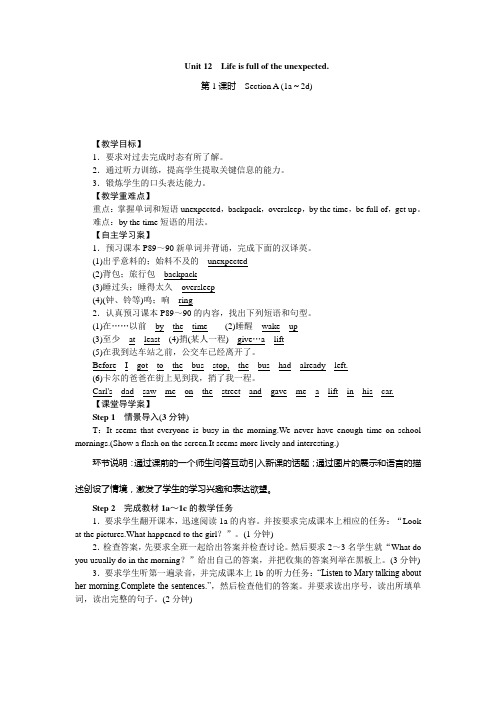
Unit 12Life is full of the unexpected.第1课时Section A (1a~2d)【教学目标】1.要求对过去完成时态有所了解。
2.通过听力训练,提高学生提取关键信息的能力。
3.锻炼学生的口头表达能力。
【教学重难点】重点:掌握单词和短语unexpected,backpack,oversleep,by the time,be full of,get up。
难点:by the time短语的用法。
【自主学习案】1.预习课本P89~90新单词并背诵,完成下面的汉译英。
(1)出乎意料的;始料不及的unexpected(2)背包;旅行包backpack(3)睡过头;睡得太久oversleep(4)(钟、铃等)鸣;响ring2.认真预习课本P89~90的内容,找出下列短语和句型。
(1)在……以前by__the__time(2)睡醒wake__up(3)至少at__least (4)捎(某人一程)give…a__lift(5)在我到达车站之前,公交车已经离开了。
Before__I__got__to__the__bus__stop,__the__bus__had__already__left.(6)卡尔的爸爸在街上见到我,捎了我一程。
Carl's__dad__saw__me__on__the__street__and__gave__me__a__lift__in__his__car.【课堂导学案】Step 1情景导入(3分钟)T:It seems that everyone is busy in the morning.We never have enough time on school mornings.(Show a flash on the screen.It seems more lively and interesting.)环节说明:通过课前的一个师生问答互动引入新课的话题;通过图片的展示和语言的描述创设了情境,激发了学生的学习兴趣和表达欲望。
九年级英语第12单元第4课时教案

九年级英语第12单元第4课时教案Unit 12 Life is full of the unexpected.Section B 1a—1e3.Activity 1dListen to the tape for the second time and finish 1d.1)Listen again. Who says each of the phrases below? Write D forDave, N for Nick and J for Joe.1. ______ a costume party2. ______ my alarm went off3. ______ stayed up all night4. ______ was tired5. ______ was really embarrassed6. ______ the other kids showed up2) Read the conversation again and fill in the blanks.Someone has ever tricked Dave on April Fool’s Day. A friend once invited him to a costume party. Finally he found he was the only person wearing a , and he was really .Last April Fool’s Day, when Nick’s alarm clockI got up, took a shower, and went to school. But the school was empty. An hour later, the other kidsAnd he realized that his brother him. Hethe clock to an hour earlier.Joe’ s friend told him they had a math test the next day.he got the math class, he was tired because hestudying. Then he found out that his friends had fooled him. They didn’t have a test at all.4. Language points1).fool 作可数名词,意为“愚人,傻瓜;受骗者”,常用短语:make a fool of … 意为“取笑,捉弄”,如:Don't be such a fool! 别这么傻了!fool还可作动词,意为“愚弄;欺骗”,过去式fooled,过去分词为fooled,现在分词为fooling ,第三人称单数为fools。
- 1、下载文档前请自行甄别文档内容的完整性,平台不提供额外的编辑、内容补充、找答案等附加服务。
- 2、"仅部分预览"的文档,不可在线预览部分如存在完整性等问题,可反馈申请退款(可完整预览的文档不适用该条件!)。
- 3、如文档侵犯您的权益,请联系客服反馈,我们会尽快为您处理(人工客服工作时间:9:00-18:30)。
Unit12 You are supposed to shake hands. 重点短语词组握手应该做某事be to do sthby 毕竟访问餐桌礼仪table 本应该做但没做have done late at/in 有点晚到达sth be/get be/get to sth 习惯于做某事习惯于某事sth 被用作.... Be 被用于做某事besth 特地,不怕麻烦的做某事过去常常做某事sth 计划做某事使某人感到宾至如归没有理由have 注意你的行为your manners发出噪音make (a) 做鬼脸make自学....by oneself 在适当的时间at thetime以......开始begin 忍不住做某事can'tsth代替of 对某事随意besth邀请某人做某事sb sth 指向重点短语句型讲解:1. Y ou should have asked what you were supposed to wear.你本应该问清楚怎么样穿才得体。
中的“should have asked”是“情态动词+现在完成时”表示过去本应该做某事,事实上没有做,这是虚拟语气的一种表达方式。
如:She should have gone to Beijing. 她本应该去了北京。
(没有去)同时was/were supposed to do sth 表示过去本该做某事而实际上并没有做,就相当于shouldhave done sth.2. make (some) mistakes 犯了(一些)错误。
make a mistake 犯错误(一个)与mistake相关的短语by mistake 错误地mistake…for…把..误认为…5.relaxed:用来形容人,表示人本身很放松,主语一般是人。
relaxing:指物,表示事物可使人很放松。
I feel really after the vacation.经过这次令人放松的假期后我感到很放松。
3. …it's okay if you arrive a bit late….即使你晚到一会也没关系。
a little 与a bit 二者都是“有点儿”的意思。
(1)二者相同之处在于①都可做状语,修饰比较级He is a bit/ a little older than you.②都可做主语或宾语。
Please give me a bit/ a little.(2)不同之处在于:两者修饰名词时,a little可以直接加名词,a bit必须加of后才能接名词。
A little money = a bit of money4. drop by 顺便拜访串门We just dropped by our friends'homes.我们刚刚去朋友家串门。
drop in/on sb 顺便走访某人。
你今晚过来和我们聊聊好吗?Would you drop in/on us this evening for a chat?.5. invite sb. to do sth. 邀请某人做某事如:Lily invited me to have dinner.莉莉请我吃晚饭。
6. without .prep.没有. 其后常接名词、代词和动词ing形式。
Jim今天早上没吃早饭就去学校了。
7. around the world == all over the world 全世界8.at the table 在饭桌旁at table 在吃饭类似的短语还有:in hospital by sea 由海路in future从今以后in the hospital by the sea在海岸上in the future在将来9.pick up sth 捡起挑选如:He picked up his hat. 他捡起他的帽子。
如果宾语是代词需置于pick与up之间pick it up10. start doing == start to do 开始做某事如He started reading.== He started to read. 他开始读。
11. point at 指着at是介词,后跟动作的目标。
女孩正指着墙上的地图。
point to 指向to是介词,后跟动作的方向。
当point做及物动词讲时,常用于point sth at sth 用…指着You shouldn't point your finger at anyone.你不应该用手指任何人。
12. stick v. 剌截stick…into….把…插入…别把叉子插入食物中。
n. 棒,棍请递给我那根棍子。
chopsticks 筷子是由chop(砍)+stick(棒)合成,通常用复数形式:chopsticks 13. be different from 与…不同Chinese food is different from theirs. 中国菜与他们的不同.be different in…在…方面不同这两件毛衣在颜色上不一样。
14.I find it difficult to remember everything. 我发现要记住每一样事是困难的。
形式宾语真正宾语常见的形式宾语有:find / think + it/them +形容词to do sth. 如:I think it hard to study English.15.Everying was unfamiliar.一切都是那样的陌生。
Be familiar/unfamiliar to sb 为某人所熟悉/不熟悉That face is unfamiliar to me. Be familiar/unfamiliar with sth 对某物熟悉/生疏I'm unfamiliar with that face. 16. And I had not just one set to use, but two or three of each. Not…but…不是…而是…,用来连接连个并列成分。
他们不是需要钱,而是需要时间。
Not…but…连接两个主语时,谓语动词遵循就近原则。
不是黎明而是黎明的父母去了长城。
17. Was I supposed to begin with the largest ones or the smallest?Begin with 以…开始第二课以一首歌开始。
n, beginning from the beginning 自始,从一开始at the beginning of …在…的开始(初)from beginning to end 至始至终at the beginning of December at the beginning of Winter18.E-mail English is a new kind of written English that is being used to save time.电子邮件英语是一种新型的用来节省时间的书面英语。
(1)that is being used…是一个定语从句,修饰前面的written English. 定语从句用的是现在进行时的被动语态,that在定语从句中做主语,不能省略。
(2)written English 书面英语spoken English 英语口语written 与spoken 是过去分词形式,均表被动关系,充当形容词,做前置定语。
(3)在英语中表示“被动关系”的有两种形式,一种是过去分词做定语,一种是被动语态。
The novels written by Lu Xun are very educational.鲁迅写的小说很具有教育意义。
这些小说史鲁迅写的。
The novels are written by Lu Xun.英语中表示“正在进行”的有两种形式,一种是现在分词做定语/宾补,一种是进行时态。
I found a wallet lying on the ground. (做宾补)The girl singing the song is my younger sister. (做定语)19.This is because they come from a computer program called ICQ, which means I seek you.20. can't stop doing 忍不住做某事=can't help doing sth.I can't stop laughing. 我忍不住笑.当听到这个消息,我忍不住哭了。
21…..it's created by combining letters and symbols or numbers to sound like other words….(1)be created by 由……组成,by是介词,后接名词、代词或动名词作宾语。
(2) combine .v. (使) 结合,混合combine…and…将…和…混合起来combine…with…将…与…合并Combine “tele”with “communication”, we'll get a newword “telecom”.22.Do these two on your own…独自做这两道题….On one's own 独自的,主动的,自愿的。
在句中做状语。
他现在自食其力。
Of one's own 属于某人自己的,of前常接名词或不定代词。
We have no house of our own.With one's own 用某人自己的,own后接名词。
Remember to do everything with your own ideas. 记着用你自己的想法去做事情。
23. cut up 切开切碎如:Let's cut up the water melon. 让我们切开这个西瓜吧。
make faces做鬼脸face to face 面对面练习题Section A一、选词填空(用wear , put on, dress的适当形式填空)1. It's very cold outside, ________ your coat.2. The girl who ________ in light blue is my sister.3. Many girls ________ shirts in summer time.4. Sally's sister is old enough to ________ herself.5. “Could you ________ the children for me ?”she asked her husband.6. She ________ a new sweater today.7. Lily ________a flower in her hair yesterday.8. He ________ his glass to read the letter.二、单项选择( )1. They _____ a football match if it _____ fine next Thursday afternoon.A. will have; will beB. have; will beC. will have; is ( )2.----Shall I ask Lillian to see the film with us?---- I don't think she will. She _____ it twice. A. saw B. has seen C. sees ( )3.Qingdao is one of the best places for _____ in China. A. surfing B.surf C. surfs ( )4. We _____ shake hands when we meet someone for the first time.A. supposeB. suppose ofC. are supposed to ( )5. Li Ying told me _____ for her at home. A. waits B. wait C. to wait ( )6. I _____ my homework already. A. finish B. have finished C. finished ( )7. ---- If you _____ a new idea, please call me as soon as possible.---- Sure, I will. A. keep up with B. catch up with C. come up with C. listening toB. listen to )8.Most of the girls in our class enjoy _____ music.A. listening ( ( )9. Ted ten dollars on the shirt yesterday. A. cost B. spentC. paid( )10. I want to know whether . A. will he give back the bookB. he gives back the bookC. he will give back the book( )11.They some plans for the coming summer vacation.A. have madeB. has madeC. makes( )12. Lily planed her uncle the next day. A. to visit B. visiting C. visit ( )13. Do you know Mr Green come to China? A. when B. what C.where ( )14. --- Would you like something to drink? ---- .A. No, thanks.B. Yes.C. Not at all.( )15. Do you know a sports meeting next Friday?A. what there will to beB. if there is going to beC. there was going to have ( )16. Who can help me do the work? A. other B. else C. another ( )17. ---- May I speak to Li Hua, please?----I'm afraid he isn't in. Would you like to a message? A. take B. write C. leave( )18. ---- Do you want a pear of an orange? --- . I really don't mind. A. Neither B. Either C. Both( )19. ---Excuse me, I want to know . ---I parked it behind this building. A. where did you park my car B. where you parked my carC. how you parked my car( )20. I can't say I want to visit my grandpa. It's a long time since we met last time.A. how oftenB. how longC. how soon D how much( )21. Thanks for me with my English. A. help B. helping C. helped ( )22. He the phone and began to dial the number.A. pick upB. picks upC. picked up( )23. The hand of the clock is pointing eleven o'clock. A. to B. at C.out ( )24. I'm really thirsty. I'll stop .A. to take a drink B. taking a drink C. take a drink( )25. Don't . Your father is sleeping. A. turn off the TV B. make any noise C. be quiet( )26. Nothing can make him his goals. A. to give up B. give in C. give up( )27. ---- were you away from home last year?---- About one month. A. How often B. How far C. How long( )28. He didn't understand yesterday.A. what the teacher says.B. what the teacher saidC. what did the teacher say( )29. Could you tell me ? A. how long the Fujiang River was B. how long was theFujiang River C. how long the Fujiang River is D. how long is the Fujiang River( )30. Traveling by train is cheaper and enjoyable than by air.A. more; much moreB. quite; much tooC. very; very muchD. much; far more( )31. It's rude you to speak loudly in public. A. of B. for C. to ( )32. The room was of smoke. A. full B. fill C. filled ( )33. good information he has got! A. What a B. What C. How a ( )34. clever boy he is ! A. What B. What a C. How a( )35. Could you please help me cut these potatoes? A. up B. off C. down ( )36. A good idea occur him. A. to B. at C. for( )37. It was eleven o'clock when he arrived Paris. A. in B. at C. to( )38. My grandpa is used to a walk in the morning. A. have B. has C. having( )39. Great changes in my hometown.C. has taken placeB. have taken place A. have been taken place( )40. --- Bob is late for school. ----Neither am I .A. always B. never C. ever.( )41. The problem is we should do at first. A. that B. what C. which ( )42. Mr Gereen has got used to with chopsticks. A. eat B. ate C. eating ( )43. The girl is making plans her little brother with his lessons.A. helpsB. to helpC. helping( )44. What you to do before going to bed?A. did; supposeB. are ; supposingC. are ; supposed( )45. Without a word, he left home. A. says B. say C. saying ( )46. The street is people on Sunday. A. crowded with B. crowd with C. crowd( )47. Bob, there is a book on the floor, please .A. pick it up B. pick up it C. picks it up( )48. Xiao Lin is a good students, he behaves .A. well B. good C. badly( )49. The town we visited a few years ago is much larger than before.A. itB. whoC. which( )50. --- You will go swimming this Saturday, won't you?--- . I have to work this Saturday. A. Yes, I will B. Yes, I won't C. No, I won't三、完成句子1. There's only (一点儿,少许)milk left, could you get some on your way home?2. Do you (握手)with each other when you meet someone for thefirst time?3. I (拜访)the writer on my way home yesterday.4. Though he (犯了一些错误), he is still a good boy.5. He said, “Miss Li, I'm sorry for (迟到).”6. I had a stomachache because of (错吃了食物).7.You (本应该完成家庭作业) yesterday but you didn't'8. They (计划)take a vacation next week.9. The students are (制订计划) for the new term.10. ---- How's everything? ---- .(还不错)11. He smiled, (毕竟) he succeeded at last.12. I don't think English is (难得多) than Chinese.13. They (特地)to see me every month.14. You (本应该到达)here at 8 o'clock, but you're late.15. The little girl (擦去)off the tears and laughed.16. 除最后一个问题没答外,其余问题他都答了。
